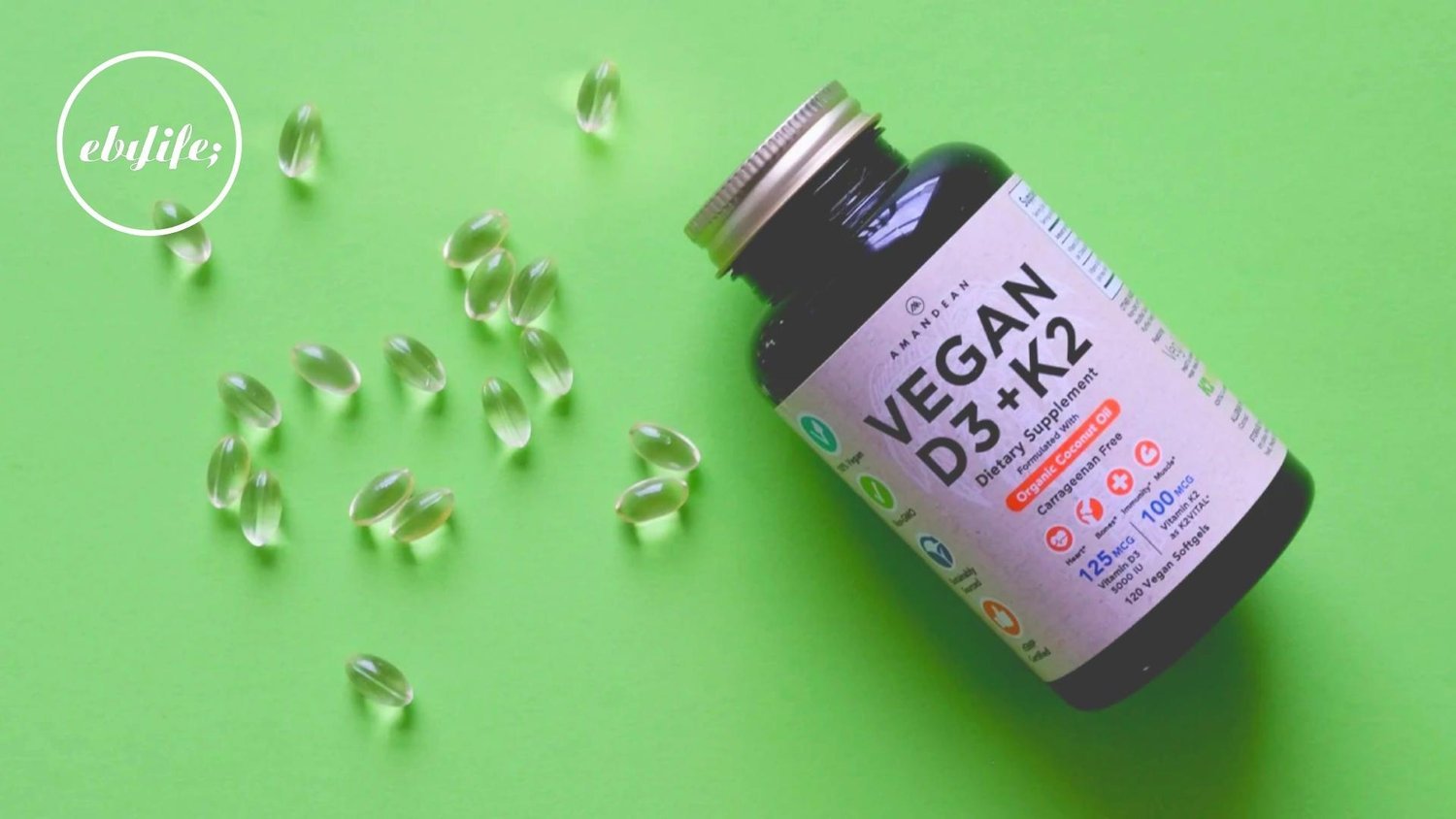Why You Need to Combine Vitamin D3 and K2
Written by Stephanie Hodges, MS in Nutrition and Exercise Science, Edited by Martin Ebner, head Personal trainer and sports nutrition specialist at Ebylife
Did you know that vitamin D and vitamin K work better together? These fat-soluble vitamins are crucial for bone and cardiovascular health. While vitamins K and D have multiple health benefits individually, they have a tremendous synergistic effect when paired together.
Vitamin D and vitamin K come in multiple forms, so it's essential to understand why D3 and K2 are better for you. In this article, we’ll discuss why that's the case, the many health benefits of vitamin D and K, and why combining them is especially beneficial.
If you're looking for a high-quality supplement, we recommend Performance Lab Vegan D3 + K2.
What is Vitamin D3?
Vitamin D is one of the most popular dietary supplements on the market today, and rightly so, as it's vital for optimal health. Vitamin D3, also known as cholecalciferol, is derived from cholesterol in the skin when exposed to ultraviolet-B (UV-B) light wavelengths. Your body can produce vitamin D from sunlight or consume it through food and supplements.
Vitamin D2 vs. Vitamin D3
Most vitamin supplements or vitamin-D fortified foods are made with vitamin D3. Vitamin D2, also known as ergocalciferol, is a synthetic form of vitamin D sometimes used in food fortification and supplements.
The key marker for measuring vitamin D status is a blood test measuring serum 25-hydroxyvitamin D or 25(OH)D. Several studies have compared the effects of D2 and D3 supplementation. For example, a meta-analysis found that D3 increased total and free 25(OH)D levels to a greater extent than D2.
Vitamin D Health Benefits
For many years, vitamin D was only known for its role in bone health, specifically in curing the childhood disease of rickets caused by vitamin D deficiency. However, recent research has revealed that vitamin D has far more benefits than previously believed. Some of vitamin D's potential health benefits, according to Mayo Clinic Proceedings, include reducing the risk of some:
Cancers
Autoimmune diseases
Infectious diseases
Type 2 diabetes mellitus
Neurocognitive disorders
Mortality
Vitamin D helps with musculoskeletal health and has also been shown to improve cognitive function and relieve symptoms of depression. This is truly a powerhouse vitamin to support well-rounded wellness.
Where Can you Get Vitamin D?
Several foods are naturally rich sources of vitamin D, and others are fortified. The best food sources of vitamin D include:
Cod liver oil
Salmon
Mackerel
Sardines
Liver
Fortified cheese, whole milk or raw cow's milk, yogurt, butter and orange juice
As you can see, the natural sources of vitamin D are mainly found in fatty fish. So, if these aren't part of your regular diet, you may want to consider supplementation.
How Can You Get More Vitamin D3 From the Sun?
To boost your vitamin D levels through sun exposure, aim for 10 to 15 minutes of direct sunlight between 10 a.m. and 3 p.m., two or three times per week without sunscreen.
Although vitamin D can also be manufactured by your body when sunlight hits the skin, this is not an option for many people living in northern climates during the winter months. In addition, the efficiency of vitamin D production from sunlight is affected by many factors, including skin melanin content, time of day, latitude, pollution, sunscreen, and cloud cover.
What is Vitamin K2?
Henrik Dam discovered vitamin K2 as he investigated blood clotting and named it K for "koagulation" (the Danish term for coagulation). He won a Nobel prize for his work.
In addition to blood clotting, vitamin K plays a critical role in bone and cardiovascular health. Vitamin D is well known for its importance in bone health. However, vitamin K2 is rapidly emerging as a vitamin D "helper," ensuring calcium is correctly deposited into the bone matrix and doesn't build up in the arteries.
In food sources and supplements, there are two main types of vitamin K:
Vitamin K1 (phylloquinone): Produced in plant foods such as leafy green vegetables, vegetable oils, and cruciferous vegetables
Vitamin K2 (menaquinone): K2 has various subtypes named MK-4 through MK-13, but MK-4 and MK-7 are the most common in the diet, found in fermented foods such as natto.
Plants synthesize vitamin K1, and you can consume it in green leafy vegetables such as kale and spinach. K1 makes up 90% of the average person's dietary intake, but the bioavailability may be as low as 20%.
In contrast, vitamin K2 can only be produced by certain bacteria (menaquinone). MK-4 is found in chicken, egg yolks, organ meats, pork, and dairy. MK-7, on the other hand, is found in fermented dairy and soy products like natto, a Japanese dish of fermented soybeans.
Research shows that MK-7 has a longer half-life and greater bioavailability than MK-4. So when it comes to vitamin K supplements, K2 is better than K1, and the MK-7 subtype has the most significant health benefits. Performance Lab Vitamin D3 + K2 supplement hits the mark in using both D3 and K2.
Vitamin K2 Health Benefits
Vitamin K is essential for blood clotting because it activates clotting factors. Without vitamin K, these proteins will not function properly. So getting adequate vitamin K through diet and supplements is vital for those with hemophilia, a genetic bleeding disorder.
Vitamin K helps keep calcium in your bones where it belongs by activating proteins that bind calcium, and a vitamin K2 deficiency can contribute to osteoporosis. Your body will have problems if you have too much calcium outside the bone cells or not enough vitamin K to activate the proteins that bind calcium in the bones.
Another concern is having excess calcium build up in the arteries. Vitamin K2 helps transport calcium into the cells and removes extra calcium from arterial walls. This protects against atherosclerosis, also known as the hardening of the arteries.
Vitamin K is also essential for a healthy nervous system. Vitamin-K-dependent proteins play key roles in the central and peripheral nervous systems, including the growth of neurons and glial cells.
Combining Vitamin D3 and Vitamin K2
Taking a combination of vitamin D and vitamin K is beneficial for many reasons.
These nutrients work together to strengthen your bones and provide other benefits, such as preventing heart disease or hypertension (high blood pressure).
They reduce calcification of the arteries, which is a leading cause of heart disease.
Vitamin D and vitamin K have been shown to boost immune system functioning.
Both vitamins help produce proteins in the bone matrix while also strengthening muscle tissue. Scientific evidence supports the idea that joint supplementation of D+K may be more effective than consuming them separately.
Vitamin D3 + K2 Daily Requirements
How much vitamin D and K do you need? The RDA for vitamin D is 15 mcg/600 IU for adults and 20 mcg/800 IU for those over 70 years old.
The DRI for vitamin K is 90-120 mcg per day for adults, but some vitamin K advocates recommend at least 100 mcg of vitamin K2 daily. You would need to eat at least one serving of natto (or four servings of sauerkraut or 20 servings of lettuce) each day to meet that recommendation.
Our Top D3 + K2 Supplement
Our favorite D3 + K2 supplement is by Performance Lab. It contains:
25 mcg - 500% NRV Liposomal Vitamin D3 (from algae)
50 mcg - 66.7% NRV Vitamin K2 (from NutriGenesis®)
It's recommended to take one capsule daily. If you are pregnant, nursing, taking a blood-thinning medication, under the age of 18, or have a known medical condition, you should consult a medical professional before using.
This 100% vegan, sustainably sourced, and non-GMO supplement can help your heart, bones, immune system, and muscle.
Resources:
Vitamin D: A Rapid Review. https://www.medscape.com/viewarticle/589256_4
Comparison of vitamin D2 and vitamin D3 supplementation in raising serum 25-hydroxyvitamin D status: a systematic review and meta-analysis. https://pubmed.ncbi.nlm.nih.gov/22552031/
Vitamin D for Health: A Global Perspective. https://www.sciencedirect.com/science/article/abs/pii/S0025619613004047
Vitamin D and Neurocognitive Dysfunction: Preventing "D" decline. https://www.ncbi.nlm.nih.gov/pmc/articles/PMC2829975/
Comparison of menaquinone-4 and menaquinone-7 bioavailability in healthy women. https://www.ncbi.nlm.nih.gov/pmc/articles/PMC3502319/
Proper Diet Can Help in Management of Hemophilia: A Nutritionist's View. https://hemophilianewstoday.com/2019/09/03/managing-hemophilia-through-proper-diet-nutritionists-view/
Multiple Modes of Vitamin K Actions in Aging-Related Musculoskeletal Disorders. https://www.ncbi.nlm.nih.gov/pmc/articles/PMC6600274/
Vitamin K and the Nervous System: An Overview of its Actions. https://www.ncbi.nlm.nih.gov/pmc/articles/PMC3648721/
The Synergistic Interplay between Vitamins D and K for Bone and Cardiovascular Health: A Narrative Review. https://www.ncbi.nlm.nih.gov/pmc/articles/PMC5613455/
Disclaimer
The content on our blog is created to inform, but should never be taken as professional medical advice. The content of our articles is not intended for use as prevention, diagnosis and/or treatment of any health complications. Before making any lifestyle changes that include diet, using supplements or exercise regime, always consult your doctor or nearest health care specialist.
This page may contain affiliate links. Our reviews, however, remain 100% independent and impartial.

